Three Different Takes on the Leaked “War Logs”
Three different ways they're viewing the leaked “war logs” across the Pond.
I’ve run across three different takes on the classified documents posted on WikiLeaks and reported on extensively by The New York Times, The Guardian, and Der Spiegel that I thought you might be interested in. First, Simon Tisdall writes in The Guardian:
The war logs, an official accounting of murderous missions, tragic incompetence and abject failure from 2004-2009, put factual flesh on the bare bones of these negative perceptions. Their publication may further undermine public support just as the campaign supposedly reaches a “critical” juncture following June’s record casualties and the sacking of General Stanley McChrystal.
The White House’s defence – that this serial bungling occurred on George Bush’s watch – appears problematic. Since Barack Obama concluded a policy review last December and decided on a “surge” of 30,000 additional troops, overall levels of violence have risen further while confusion about counterinsurgency strategy and the exit timetable has deepened.
“Obama has had several opportunities to reassess US goals and interests and in each instance he has chosen to escalate,” said Richard Haass, a former senior Bush administration official and president of the council on foreign relations. “Today the counterinsurgency strategy that demanded all those troops is clearly not working.” Afghanistan was now Obama’s war, Haass said, and he was losing it. “It’s time to scale down our ambitions and reduce and redirect what we do.”
Con Coughlin, writing in The Telegraph, demurs:
I welcome publication of these documents not because they show that the war is unwinnable, but because they provide a welcome justification for the new counter-insurgency strategy that was devised by former U.S. General Stanley McChrystal at the end of last year to win the war.
The documents leaked to Wikileaks relate to the period between 2004 and 2009, when the civilian casualty rate was reaching alarming proportions and Pakistan’s commitment to eradicating the Taliban/al-Qaeda terrorist infrastructure was very much in question.
But a great deal has changed in Afghanistan since those uncertain times, and we should all take heart from the fact that we have learnt the lessons of the warnings contained in the leaked documents. Pakistan is now fulfilling the role of a genuine ally of the West, and has lost considerable more troops fighting the Taliban than Nato troops. One of the founding principles of the McChrystal doctrine, meanwhile, is for Nato forces to take every care to avoid civilian casualties, even if it means putting the lives of their own troops at risk.
The commentary in Spiegel Online is especially interesting. For example, there’s this about the role of “foreign fighters” in the conflict:
While the Afghans were still hesitant to join the new conflict between the West and the Islamists in 2006, foreign fighters — Arabs, Chechens, Uzbeks and Chinese Uighurs — played a key role from the start. They were ideological hardliners with close ties to al-Qaida, and they had a wealth of experience in the use of bomb attacks and suicide bombings, which were largely unknown in Afghanistan until then. In this way, the deadly techniques that had been used in the Iraq war were transferred to Afghanistan.
The first report of the notorious foreign fighters surfacing in northern Afghanistan was documented in the war logs on July 15, 2005. According to the entry, five Chechens arrived in the city of Kunduz to deliver modern weapons to a Taliban commander and attack the United Nations office there. The attack that was supposedly planned did not take place, but the transfer of technical know-how and new weapons systems to the Taliban described in the document would later contribute to the Germans’ plight in Kunduz.
I found several things interesting in that particular snippet. First, it illustrates how “foreign fighters” can function as a force multiplier for local jihadists. Second, it casts some doubt over Leon Panetta’s recents comments on the very small number of Al Qaeda actually in Afghanistan at the present. I wonder how he’s defining “Al Qaeda”? Does he mean particular identified individuals or does he mean foreign fighters aiding the Taliban in Afghanistan? The first definition is probably far too narrow to cast meaningful light on the state of the conflict in Afghanistan. The second is almost certainly far too broad.
The second snippet I thought I’d bring to your attention is this one on the role of the Bundeswehr in Afghanistan:
A comparison between the German government’s reports on Afghanistan to the federal parliament with the events described in the American war logs quickly reveals the extent to which important information is withheld from the German public. Government officials in Berlin keep their lips sealed when it comes to incidents in the region where Bundeswehr soldiers are stationed if they do not directly affect the German troops. But these incidents paint a more accurate picture of the real situation in northern Afghanistan and the kinds of threats the German troops there might face.
Countless reports in the war logs describe how the Afghan police and army in the north are bitterly fighting an enemy that is constantly advancing. In these clashes, German soldiers usually serve, at most, as advisors or medics tending to the wounded in field hospitals.
Day after day, police checkpoints are attacked or come under fire, patrols are targeted in deadly ambushes and roadside bombs explode. The number of Afghan security forces wounded or killed exceeds the German casualty count by far. It demonstrates that Afghanistan’s armed forces are still a long way from being able to pacify the country, and that Afghanistan is in fact perilously close to the brink of a new civil war.
The numbers also illustrate something else as well: How little the Germans have achieved.
Whether the revelations such as they are in the “war logs” are seen as more inflammatory in the United States or among our NATO allies is an open question. Polls in the United Kingdom and Germany show even less popular support for continuing the conflict in Afghanistan than there is here, where the number of Americans with a favorable impression of the war in Afghanistan has fallen below 50%.
My own views on the leaks is fairly straightforward:
- The perpetrator of the leaks should be prosecuted to the full extent of the law.
- They don’t tell me anything I didn’t know (or suspect) already.
- I find that they completely support the view I’ve had since 2001—that we accomplished what could have been reasonably expected to be accomplished in 2001 and that our ability to accomplish a great deal more with a force that could be supported logistically in a timeframe and at a cost that would be accepted by the American people is very dubious, indeed.
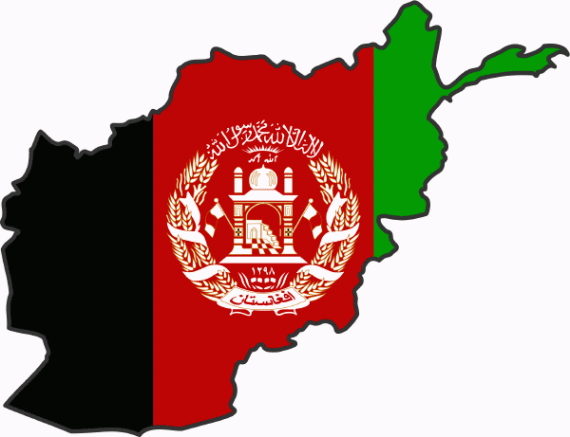

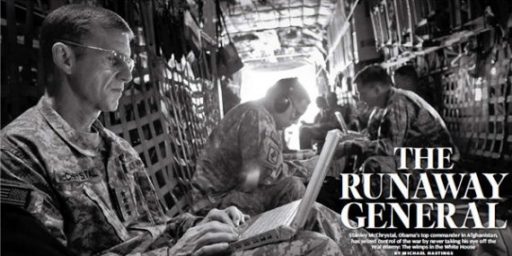
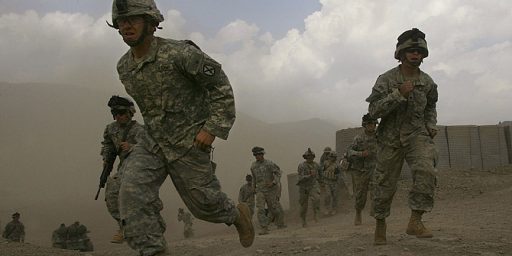

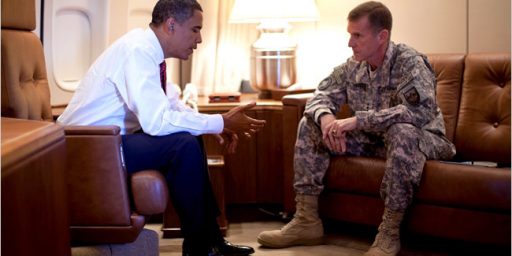
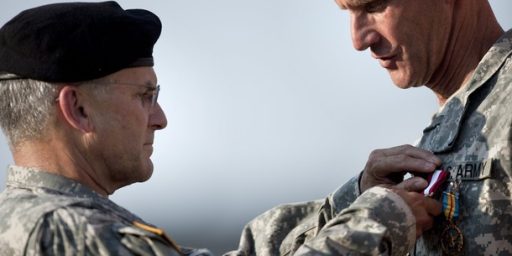
We’re largely on the same page about this war, as I observed the other day. But it’s ironic that you’re arguing the leaker should be prosecuted to the full extent of the law (as I’ve no doubt he will be) but he’s performed something of a public service as leakers of this sort of info, like Ellsberg, often do.
I think that ways and means are important. I don’t think that civil disobedience should just be excused in a representative democracy. The situation in Gandhi’s India or the American South of the 1960s was different—no working representative democracy. Even though I don’t think much of who people elect and I think the way districts are drawn is often tyrannical I think we still have functioning representative democracy.
I’d also like to see a lot more rigor in how documents are classified. A document should only be classified if its release would be injurious to U. S. interests, not merely politically embarrassing or damaging to the policy the administration is pressing. Nearly a million people have top secret security clearances. IMO if you can’t prune that down to about 100 you need to start making the federal government show cause for why something should be classified. But that’s not the way the law is now.
This is like the Pentagon Papers Redux. The details of any war are not pretty.
Isn’t it generally understood that the war in Afghanistan is a low probability of success venture?
Funny, just last week, before the leaked docs were online, I posted, “Why Petraeus Won’t Matter” in Afghanistan.
There is no better general for the command of Afghanistan than Gen. David Petraeus. And, if the ‘Stan is the main effort today in what used to be called the War on Terror, then there is no better general to take Petraeus’ place at US Central Command than Gen. James Mattis. Mattis and Petraeus go together like peas and carrots. But they will fail.
An active-duty Army lieutenant colonel who has served in Afghanistan and commanded a combat battalion in Iraq emailed me, “I think your article is spot on.”
A U.S. Marine Reserve field grade infantry officer with both combat and civilian years in Iraq, and who has known Gen. Mattis personally for many years, emailed, “Unfortunately, I think you nailed it.”
Wish it wasn’t so.
Donald Sensing says:
Monday, July 26, 2010 at 13:41
“The fact is that the Obama administration, like Bush’s before it, does not know what it is trying to do in Afghanistan.”
I largely agree with what you say although it’s not really true to say we don’t have a strategy for Afghanistan. We do have a strategy but it’s just not realistic in the context of the conditions on the ground and the resources we’re willing to commit there. I also think you under-rate the president. I think he understands the dilemma fairly well but has to balance a bunch of domestic and international political issues that make rapid withdrawal a non viable option at present. By the middle of 2011 the situation could be very different.
Well, then, if the strategy is “not realistic in the context of the conditions on the ground and the resources we’re willing to commit there,” then we don’t have a strategy. We have a wish. But wishes are not plans and hope is not a method.
“I also think you under-rate the president.” Sorry, I do not think that is possible. This president is not a strategic thinker. He is a seminar facilitator.
Governments lie. They lie a lot. Indeed, governments first instincts are to lie. They lie about big things as well as little ones.
The government tells you these papers should be kept secret. And you believe them. Silly you.
Or, you don’t believe them, and you know the release of this ‘secret’ stuff harms the USA mostly in revealing some incompetence, but you say, as I often do, there are rules, and the leakers broke them.
So let me tell you about the government attitude to rules…
Donald Sensing says:
Monday, July 26, 2010 at 16:20
“then we don’t have a strategy.”
You’re getting into bumper sticker territory. It’s not unusual for countries to have strategies that are unrealistic. The British/French in 1939, Germany in 1941, the Japanese in 1941, the list is endless.
“Sorry, I do not think that is possible. This president is not a strategic thinker.
He is a seminar facilitator.”
The evidence from his campaign against Clinton suggests he’s quite a considerable strategic thinker. And you perhaps don’t realise that being a seminar facilitator is part of the job description of the president. The better you are at it the better you tend to be as president. FDR, Truman, Eisenhower, Kennedy, Reagan, Bush senior, Clinton and Obama are all notable exponents of this skill.
There’s something else to consider here. Whoever leaked these documents did so with an agenda. By all accounts the documents aren’t a complete history of the conflict, there are many gaps. If the agenda of the leaker is to discredit the Afghan campaign and Obama’s “surge” strategy then it seems likely that only those documents that place the campaign in the worst possible light would be leaked. If that is the aganda it appears to be working.
But I’ve yet to see anyone sitting up straight in their chair saying ‘Hey, our perception of the Afghan conflict is being manipulated by someone with an agenda who’s operating in the shadows’.
It is hard to quantify troubles avoided unless you don’t avoid them. See France and Britain vs Germany 1936.
Swen Swenson says:
Monday, July 26, 2010 at 19:28
We’ve been on diet of happy talk from the military in Afghanistan from the winter of 2001 to early 2009. Opposed to this was a mass of reporting from the media and independant pundits like Packer that said the complete opposite. Even now were being told victory is around the corner but in the next breath there are hints our troops need to be there for another ten years.
“We’ve been on diet of happy talk from the military in Afghanistan from the winter of 2001 to early 2009.”
I disagree.
I’ve been against the war in Afghanistan from the start but I don’t feel like anyone from the Bush or Obama administrations or the Pentagon every painted a false picture of an easy win there.
I still believe the constant “Where’s Osama?” grilling Bush got from the press starting just a few weeks after the start of the war contributed to his decision to invade Iraq…
ponce says:
Tuesday, July 27, 2010 at 04:38
‘I disagree.
Note I specifically said up to 2009. You’re welcome to believe the Military hasn’t been making optimistic noises about progress in Afghanistan, their opium eradication programs, training of the Afghan army and police, the wonderful democratically elected Karzai govt, regular visits to Washington, denial of civilian casualties, the Taliban was on the ropes, the US could easily handle wars in Iraq and Afghanistan, etc etc. etc. So why have I been reading critiques of this for literally years by informed people like George Packer. Must have been imagining it.